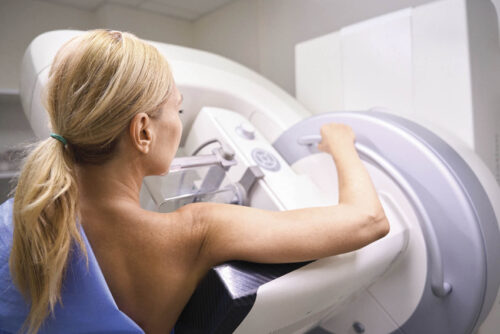New recommendation for getting first mammogram

The U.S. Preventive Services Task Force (USPSTF) this year lowered the age recommendation for when individuals should begin getting screened for breast cancer. The Task Force now advises eligible individuals who are not at high risk and who don’t have a family history of breast cancer to get screened every other year starting at age 40, which is ten years earlier than its previous recommendation. Regular screenings are recommended to continue through age 74.
Breast cancer is the second most common cancer among women, accounting for about 30% of all new cancers diagnosed, according to the American Cancer Society. It is the second leading cause of cancer death in women, behind lung cancer. Early detection is key, and a mammogram can detect a tumor up to two years before it can be felt by the patient or a health care provider.
“Screening for breast cancer saves lives, so it is important for everyone who is eligible to be screened to follow these new recommendations,” says Lorna Fitzpatrick, MD, vice president of medical affairs and senior medical director at Excellus BlueCross BlueShield. “Unfortunately, not everyone who is eligible is getting a mammogram.”
About 20% of individuals in New York state who are eligible for breast cancer screening are not getting screened, according to an Excellus BCBS review of the most recent data from the National Cancer Institute. Among eligible individuals between the ages of 50 and 74, 81.4% had a mammogram in 2022.
Obstacles that may prevent someone from having routine breast cancer screening can include lack of transportation, inconvenient screening facility hours, and/or patient apprehension about screening discomfort and safety.
To combat the transportation barrier, some hospitals and medical practices bring a mobile mammography van out into the community. Many hospitals and clinics also offer extended hours for on-site mammography screenings, so appointments can fit most schedules.
“Screening for breast cancer can be uncomfortable, but the test only takes a few minutes,” says Dr. Fitzpatrick. “The potential benefits of early cancer detection outweigh any discomfort or concerns.”
Routine breast cancer screening is a preventive service that is among the essential benefits included in all Marketplace health plans and many other plans, at no cost to the patient, even if a yearly deductible has not yet been met. Note: These services are free to the patient only when delivered by a doctor or other provider in your health plan’s network.
An individual’s risk factors determine when they should begin getting screened for breast cancer. Those at high risk or with a family history of breast cancer should ask their health care provider about the right age and frequency of screening for them.
Learn more about breast cancer and screening by visiting the U.S. Preventive Services Task Force website at https://uspreventiveservicestaskforce.org and typing “Breast Cancer Screening” in the search box.
Provided information





